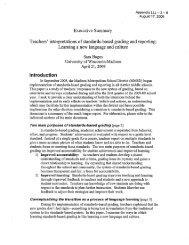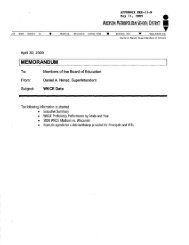MADISON METROPOliTAN SCHOOl DISTRICT - School Information ...
MADISON METROPOliTAN SCHOOl DISTRICT - School Information ...
MADISON METROPOliTAN SCHOOl DISTRICT - School Information ...
You also want an ePaper? Increase the reach of your titles
YUMPU automatically turns print PDFs into web optimized ePapers that Google loves.
Measurable Student Outcomes: number of students accessing the Literacy Mentor program,<br />
scores on formal assessments:<br />
100% of teachers will report reading and writing in their classes. 100% of students will report that they<br />
are required to read and write in all their classes. EPAS and WKCE reading scores will rise over time.<br />
Ongoing Evaluation and Assessment Plan:<br />
Voluntary literacy walkthroughs by department to observe the increased use of common literacy<br />
practices.<br />
East- End of Year Summary<br />
What we have accomplished: 2011-2012<br />
• Implement East's plan for core writing across-the-curriculum:<br />
o Common school-wide rubric<br />
o Common expectations around frequent use of quick writes and writing prompts<br />
o Common use of MEL-Con graphic organizer<br />
• Acquired and used data (Explore, SRI, grades, credit accumulation) to create a database (early<br />
warning system) and inform appropriate interventions for current East students<br />
• Created and implemented a common formative and summative writing assessment for all 9th graders<br />
• Offered and implemented extensive literacy (particularly writing and formative assessment) PO during<br />
PCT<br />
• Offered and implemented extensive literacy (particularly AVIDffops and WICOR) PO in Leadership<br />
Team and during PCT<br />
• Compiled and shared student reading/writing data with Freshman Academy and entire school and<br />
provided PO for how to use the data to improve instruction.<br />
• Created a greater culture of literacy by mak'1ng literacy more visible throughout the building (Tower<br />
TV, Peppy Writing Posters, AVID posters)<br />
• Connected more with parents and the community through East High United and literacy intervention<br />
communication through letters home and several meetings with middle schools<br />
• Collaborated with Freshman Academy and middle schools to modify and improve a systematic<br />
method by which we can identify and place freshmen into appropriate literacy interventions for 2012-<br />
2013<br />
• Created innovative add-on literacy intervention options for struggling readers who are not currently<br />
supported outside the core classroom (to align with successful Rtl2 models)<br />
• Trained study-hall tutors and mentors in literacy strategies to support students during study halls and<br />
in classes<br />
• Identified common vocabulary and strategies used in SS and English gth and 10 1 h grade classes<br />
• Presented Critical Literacy at IRA convention in Chicago<br />
• Conducted pilot comprehension/fluency ORFs in several literacy classes and a geology class. These<br />
ORFs will be used in all literacy classes next year (and in several core classes).<br />
Current and long-term literacy goals:<br />
• All students read, write and think critically throughout the day in all their classes.<br />
• All teachers model researched-based content-specific reading and writing strategies for all their<br />
students several times a week.<br />
• All students have access to engaging texts (both fiction and discipline-specific non-fiction) at their<br />
grade level and at their reading level throughout the day.<br />
• All struggling readers have extra time to hone their reading, writing, critical thinking and study<br />
skills: they have access to add-on (elective) intervention classes like READ 180, study skills<br />
classes or other special classes to fit their needs and learning styles taught by expert literacy<br />
teachers. This requires that sufficient courses/options exist.<br />
• All instruction, but especially literacy instruction, focuses on student meta-cognition, inquiry and<br />
building meaning.<br />
• All students will take common content specific skills assessments at the beginning of the year to<br />
pinpoint skill strengths and weaknesses.<br />
36


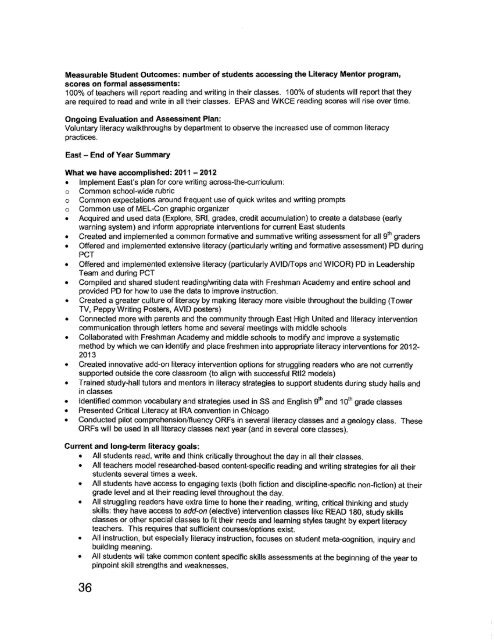
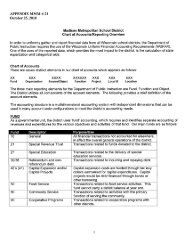
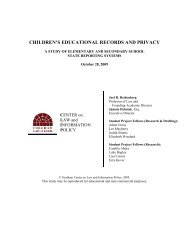
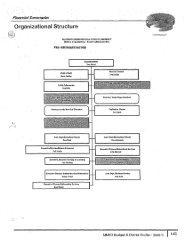
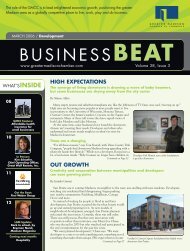
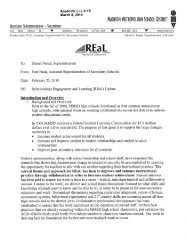
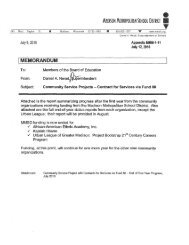
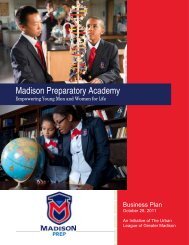
![by Shaina Wright [PDF] Ralph Waldo Emerson Prize 2006 - School ...](https://img.yumpu.com/26083584/1/174x260/by-shaina-wright-pdf-ralph-waldo-emerson-prize-2006-school-.jpg?quality=85)
